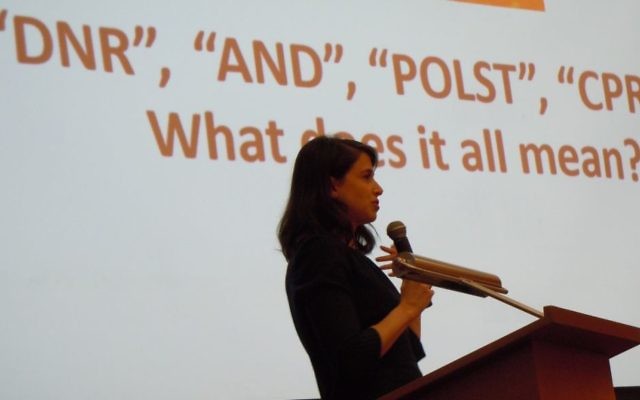Documents Defend End-of-Life Decisions
Thinking about death isn’t fun or pleasant, but one of the best things you can do for your loved ones is to make formal plans for your end so they don’t have to.
Two lawyers, Michelle Koufman and Abbey Flaum, walked a crowd of about 75 people through the steps they need to take and the forms they need to fill out in Georgia to ensure that end-of-life decisions and actions match their preferences. The meeting Sunday, Sept. 25, at the William Breman Jewish Home was the first of two sessions about creating a “top drawer file” of vital documents for your heirs.
The failure to have the family conversation about what people, especially but not exclusively the elderly, want in terms of lifesaving medical care has led to a great disparity between those preferences and actions, Koufman said. For example, a Centers for Disease Control and Prevention study in 2005 found that 70 percent of people would prefer to die at home, but most people die in hospitals.
If you want your preferences carried out, you need to engage in advance life planning instead of waiting for a crisis, she said. A family should engage in a continual cycle of discussion, decision and documentation about what care people do and do not want.
In Georgia, any competent adult may refuse any medical treatment, including life support, for any reason, Koufman said.
The wise step for any adult who has a chronic illness or otherwise frequently receives medical care is to complete a physical order for life-sustaining treatment, Koufman said. That POLST form, which is pink to be highly visible, is filled out and signed by a physician and a patient or a patient’s representative to provide immediate guidance in a medical emergency.
The form, which can be updated at any time, directs whether the patient wants to receive CPR, medications, nutrition and fluids through tubes, and other lifesaving measures. Legally, the wishes expressed on the POLST must be followed in all health care settings, Koufman said.
People will keep the form on their refrigerators and or beside them when they sleep to be sure they are seen, she said.
The POLST works with an advance directive for health care, the form that in Georgia and some other states combines a living will and a durable power of attorney to guide end-of-life decisions. While the POLST is important for anyone who anticipates those decisions coming soon, the advance directive is appropriate for any adult because accidents happen, Koufman said.
Flaum used the example of Terry Schiavo, whose husband and parents fought in court for 15 years while she lay in a hospital bed in a vegetative state, to show the value of completing an advance directive. If Schiavo had expressed her wishes in a living will, her family would have avoided the bitter legal battles.
The Georgia advance directive form, created in 2007, is comprehensive in addressing treatment preferences, appointing an agent to make decisions for you before and after death (including whether to have an autopsy and donate organs), and choosing a guardian in case you need one.
The form is also confusing, Flaum said, as to whether you’re opting into or out of care and whose decisions take priority if there are conflicts. So she advised completing the form with the help of a lawyer.
The conversation on end-of-life planning will continue Sunday, Oct. 11, with a focus on wills, trusts and other financial concerns.
—
What: “Preparing Your Top Drawer File,” Part 2
Who: Michelle Koufman and Abbey Flaum
Where: William Breman Jewish Home, 3150 Howell Mill Road, Buckhead
When: 2 p.m. Sunday, Oct. 11
Cost: Free; RSVP to 404-351-8412 or at JewishHomeLife.org





comments